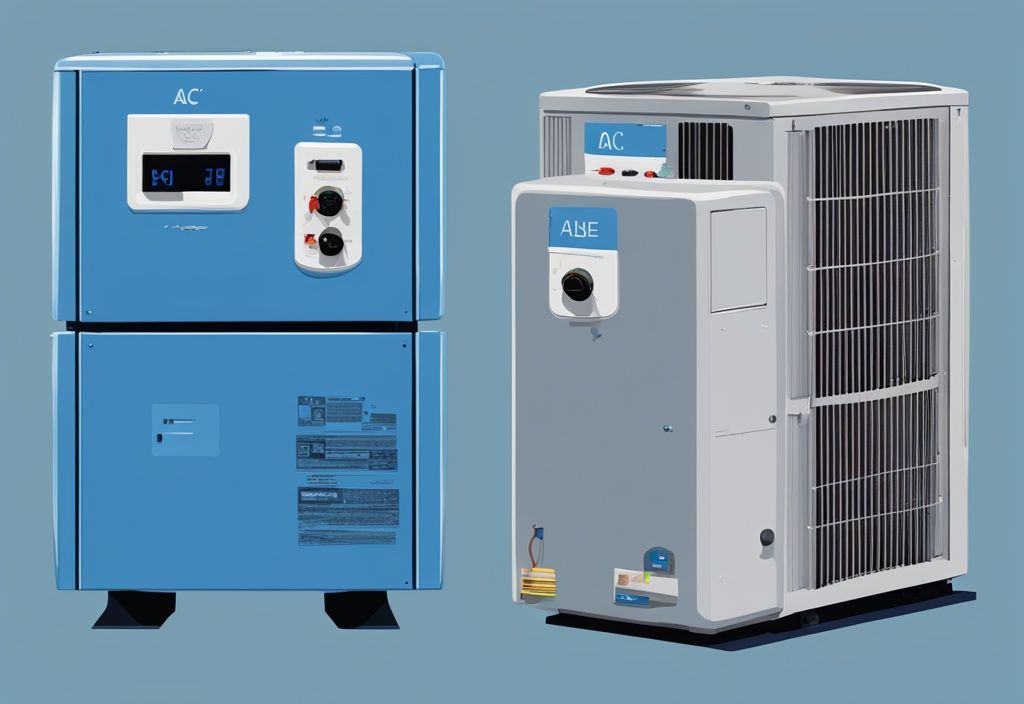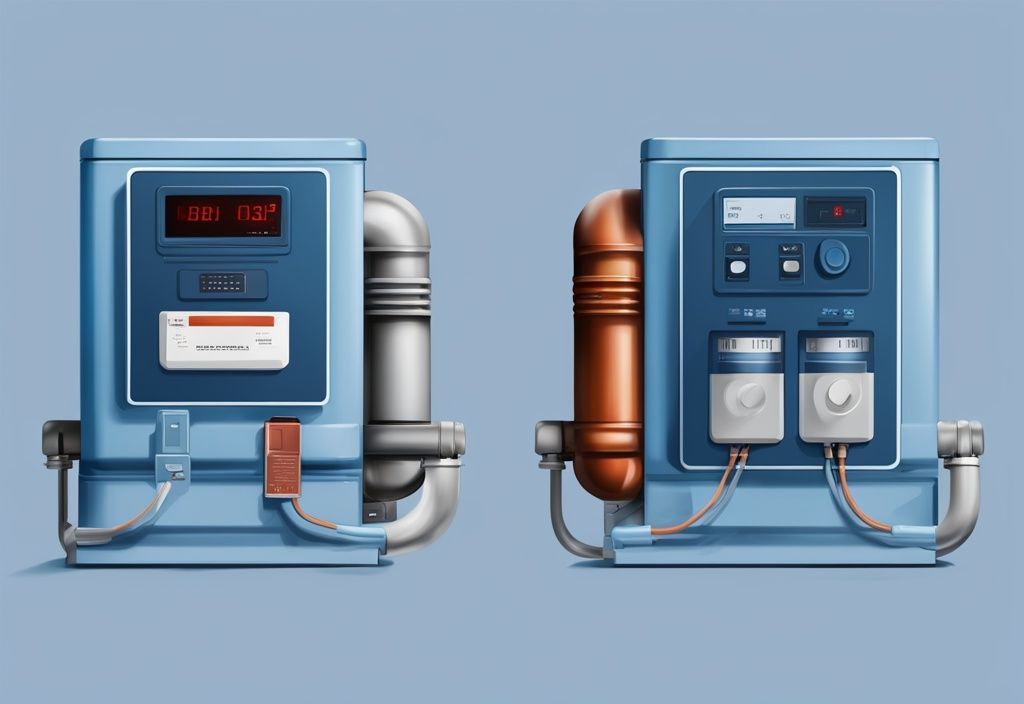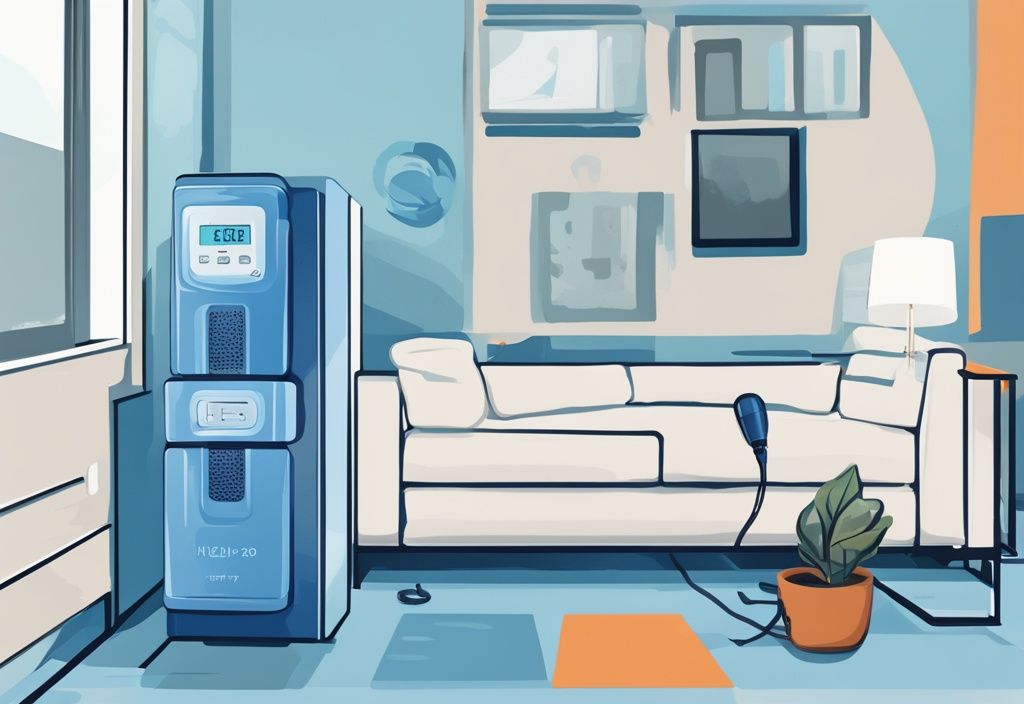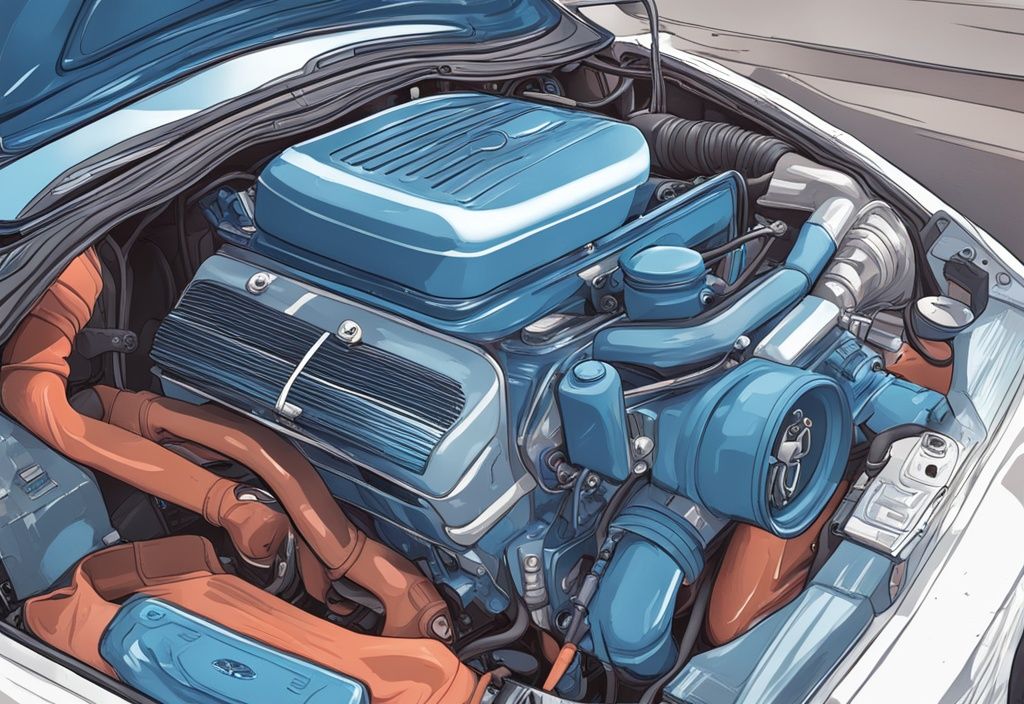Is AC Electric or Gas? Uncover the Best Choice for Your Needs
“Is your air conditioner powered by electricity or gas?” This question plagues many homeowners, puzzling them with the intricacies of their cooling systems. I’m John Parker, a seasoned HVAC technician and in this guide, I intend to alleviate that confusion.
Diving deep into the mechanics of air conditioners, we’ll discuss their efficiency, cost implications, safety, and environmental impact. All of this is key in deciding on the perfect AC system for your home.
So, join me as we unravel the mysteries of your home’s cooling system. By the end of our journey, you’ll be well-equipped to make an informed choice between electric or gas, adapting to your comforts and needs. Let’s turn the heat down and heighten your understanding.
Understanding Air Conditioners
Air conditioners (ACs) are essential for keeping indoor spaces cool and comfortable. From their fundamental operation to the intricate components, it’s vital to grasp how these systems work. Let’s dive into the essentials of ACs, addressing common questions and demystifying their operation.
What is an AC?
- Air conditioners primarily use electricity to function. So, if you’re wondering, “is AC electric or gas?”, the answer is electric.
- ACs are designed to cool and dehumidify the air in your home, making it more comfortable, especially during those scorching summer months.
- They operate by transferring heat from inside your home to the outside, employing refrigerant in a continuous cycle.
- The term “recharging” in reference to ACs means refilling refrigerant, not adding fuel for power. So, no gas involved here!
How Do Air Conditioners Work?
Air conditioners rely on a fascinating process involving refrigerants and phase changes to keep your home cool. Here’s a quick rundown:
- The cooling process kicks off when the refrigerant absorbs heat from the indoor air and then releases it outside.
- This refrigerant shifts between liquid and gas, soaking up and releasing heat as needed.
- By powering the refrigerant cycle with electricity, the AC is able to compress the refrigerant gas, leading to the cooling process that ultimately circulates cool air indoors.
Key Components of an Air Conditioning System
To understand how your AC system works, it’s crucial to know its main components:
Compressor
- The compressor is the heart of the cooling cycle, pressurizing the refrigerant gas to get things started.
- It’s an essential part powered by electricity, emphasizing the point that, “is AC electric or gas?” — definitely electric.
Outdoor Condenser Unit
- Located outdoors, this unit releases the absorbed indoor heat to the outside air.
- It houses the compressor and condenser coils, crucial for the cooling cycle.
Evaporator Coil
- The evaporator coil sits inside your air handling unit or furnace.
- Its role is to absorb heat from indoor air as the refrigerant evaporates, helping to cool your home.
Air Handling Unit
- This unit contains the evaporator coil and a blower fan that circulates cooled air throughout your home.
In this video, you'll learn how a typical home air conditioning system operates, highlighting its electric components and clarifying why air conditioners are primarily electric rather than gas-powered. - It’s central to distributing that refreshing, conditioned air to every room.

Electric Air Conditioning Systems
Electric air conditioning systems are a go-to choice for many homeowners looking for efficient and reliable cooling solutions. These systems use electricity to drive their cooling cycle and offer distinct pros and cons worth considering.
How Electric ACs Function
Electric air conditioners work by using electrical power to compress refrigerants. This causes the refrigerants to change phase, which absorbs and releases heat. Let’s break it down:
- Compressing Refrigerant: The process starts by using electricity to compress the refrigerant. This compression changes the refrigerant from a gas into a liquid.
- Heat Absorption: As the refrigerant evaporates, it absorbs heat from your indoor space, effectively cooling the air.
- Heat Release: Finally, the compressor releases the absorbed heat outside, and the cycle begins anew.
Advantages of Electric ACs
When it comes to electric air conditioners, there are several reasons why they’re a hit among homeowners:
- Energy Efficiency: These units are highly energy-efficient, especially when you pair them with renewable energy sources like solar or wind power.
- Cost-Effective: Generally, electric ACs have a lower upfront cost for purchase and installation compared to gas-powered systems.
- Maintenance: They are easier and safer to maintain, with fewer complexities and hazards involved.
- Environmental Impact: Depending on the electricity source, these systems can be more environmentally friendly, lowering carbon emissions if powered by clean energy.
Disadvantages of Electric ACs
Despite their many perks, electric ACs do have some limitations:
- Power Reliance: They can be a hassle during power outages, especially if you’re in an area with an unstable power supply.
- Operational Costs: In regions where electricity is pricey, running these systems could be more expensive compared to using cheaper energy sources.
Gas Air Conditioning Systems
When discussing whether an AC is electric or gas, it’s important to note that gas HVAC systems utilize a combination of electricity and gas.
For the cooling process, these systems rely entirely on electricity. This means that the air conditioning unit itself doesn’t use gas as a power source. Instead, gas is primarily used for the heating function in these systems. The heating is generated by a gas furnace, while the cooling mechanism remains electrically powered.
How Gas ACs Function
Alright, let’s break it down. Gas AC systems mainly rely on electricity to keep your home cool. The cooling unit doesn’t sip any gas at all—it’s purely electric. But when it comes to heating, that’s where the gas steps in. A gas furnace generates the heat, ensuring you stay toasty during winter. So, the system cleverly uses electricity for cooling and gas for heating.
Advantages of Gas ACs
- Efficient Heating in Cold Climates: Gas furnaces are incredibly efficient when it comes to heating, making them perfect for places with freezing winters. They can quickly warm up your space, keeping you comfy even during those harsh cold snaps.
- Operates During Power Outages: One huge advantage is that gas heating can work even if there’s no electricity. This means you can still heat your house during power outages—pretty handy, right?
- Cost-Effective Operation: Depending on local prices, using gas can be cheaper than electricity. In areas where natural gas is affordable, you might save a few bucks on your heating bills with a gas furnace.
Disadvantages of Gas ACs
- Higher Initial Costs: Gas HVAC systems often come with a heftier price tag right from the start. The purchase and installation can set you back more compared to electric systems due to their extra complexity.
- Safety Concerns: Heating with gas brings some safety risks, like potential carbon monoxide leaks. Regular maintenance and safety checks are crucial to keep everything running smoothly and safely.
- Complex Maintenance: Gas systems require specialized care, and maintenance can be more complicated and expensive. This long-term care, though essential, can add to the overall cost over time.

Comparing Electric and Gas AC Systems
Deciding whether an AC system is electric or gas depends on various factors like energy efficiency, operational costs, environmental impact, and safety considerations. Here’s a breakdown of these factors to help you make an informed choice.
Energy Efficiency
When determining is AC electric or gas, energy efficiency is a key factor. Electric HVAC systems often outshine gas systems in this area. Why? Well, it’s because they convert electricity directly into cooling, making them highly efficient. And if they’re powered by renewable energy, that’s a bonus! Gas systems, sadly, lose energy during combustion, which means they aren’t as efficient for heating purposes.
Operational Costs
Figuring out is AC electric or gas takes a good look at operational costs. For cooling, using electric ACs is often cheaper, especially if you live somewhere with moderate electricity prices. But when the frost sets in, gas systems can be easier on the wallet, particularly if natural gas prices are low in your region. Local utility costs play a big role here in determining the overall expense of running either system.
Environmental Impact
Thinking about the environment is essential when deciding is AC electric or gas. Gas systems emit greenhouse gases during combustion, contributing to climate change. Electric systems, though, can be much cleaner, particularly if you’re tapping into renewable sources like solar or wind energy. When powered by green energy, electric ACs drastically reduce their environmental footprint.
Installation and Maintenance Costs
The topic of is AC electric or gas also covers installation and maintenance expenses. Electric systems tend to have lower initial installation costs, making them attractive right off the bat. Maintenance-wise, they might need less frequent servicing, but repairs can be a bit pricey. Gas units, meanwhile, generally come with higher repair costs due to the complexity and safety measures required for handling gas.
Safety Considerations
Electric AC Safety
Looking at safety issues, evaluating is AC electric or gas shows that electric ACs are typically safer. They eliminate worries about carbon monoxide leaks, making them a secure choice for home use. With fewer safety hazards, electric systems give you peace of mind alongside efficient cooling.
Gas AC Safety
Safety is crucial when thinking about is AC electric or gas. Gas systems come with potential risks, like carbon monoxide leaks, so regular maintenance is a must to keep things safe. Proper routine maintenance can help mitigate these risks and keep your environment secure.
Choosing the Right AC System
When deciding between an electric or gas AC system, several key factors can guide you to the best choice for your home. Let’s dive into the most important considerations to keep in mind to ensure your space remains comfortable year-round.
Factors to Consider
Geographical Location
- Living in colder climates? You might benefit from the efficiency of gas furnaces for heating. These systems are fantastic at keeping your home warm and cozy during those harsh winters.
- If you’re in a warmer climate, electric ACs could be your best bet. They’re built to efficiently handle the higher cooling demands of hot weather, ensuring your indoor spaces stay refreshingly cool.
Electricity and Gas Prices
- Compare your local utility costs to find the more economical option. Taking a closer look at electricity versus natural gas prices can help you make a wallet-friendly choice.
- Think about fluctuating natural gas prices against more stable electricity costs. Electricity tends to offer more predictability, which can be helpful for budget planning.
Environmental Consciousness
- Electric systems can be kinder to the environment when paired with renewable energy sources like solar or wind, especially as innovative technologies emerge to enhance their efficiency, such as those discussed in this article on [air conditioning and climate crisis solutions](https://www.theguardian.com/environment/2021/sep/03/air-conditioning-climate-crisis-clean-tech-solutions). This can significantly lower your carbon footprint.
- Opt for systems with lower greenhouse gas emissions to do your part for the planet. Environmentally-conscious choices contribute to sustainability and less environmental impact.

Home Needs and Comfort
- Take stock of your home’s heating and cooling needs based on its size, insulation, and your comfort preferences. This ensures you get a system that caters to your specific requirements for ultimate comfort and efficiency.
- Think about how reliable and consistent the system will be in various weather conditions. It’s vital to choose a system that will perform reliably and consistently throughout the year.
Consulting with HVAC Experts
- HVAC service providers can offer personalized advice based on your specific needs and budget. Their insights are invaluable, providing recommendations tailored to your unique situation.
- Professional guidance can demystify confusing aspects and ensure you make the right choice. HVAC experts can simplify complex decisions, making the process much more straightforward.
Conclusion
Deciding whether to opt for an electric or gas air conditioning system largely depends on various factors, including operational costs, energy efficiency, environmental impact, and your specific home needs. Let’s delve into these considerations for a comprehensive understanding.
Operational Costs
When pondering is AC electric or gas, operational costs weigh heavily on the decision. Electric AC systems usually seduce with lower purchase and installation costs, making them a tempting option right off the bat. However, keep in mind that their running expenses can climb, especially if you’re in an area with high electricity rates. On the flip side, gas systems might start pricier but could offer savings in regions where natural gas is a bargain.
Energy Efficiency
Looking at energy efficiency, electric air conditioners often come out on top, particularly when you’re tapping into renewable energy. Gas systems, even though they shine in heating during those chilly months, tend to lose more energy in the gas combustion process. For those of you gunning for consistent efficiency, electric systems often have an edge.
Environmental Impact
The environmental impact is another crucial factor in the debate over is AC electric or gas. Electric systems, especially when running on green energy, leave a smaller carbon footprint. Gas-powered units, unfortunately, emit greenhouse gases and contribute to climate change. So, if being kind to our planet is a priority, electric units often emerge as the eco-friendly champions.
Home Needs and Comfort
Your home’s specific needs can tip the scales between electric and gas AC systems. In colder areas, the efficient heating prowess of gas furnaces can be a real boon. On the other hand, in warmer climates, where cooling is key, electric systems might suit your needs better due to their popularity and easier installation.
Consultation with HVAC Experts
Lastly, seeking advice from HVAC experts can provide tailored insights specific to your home’s requirements. Whether it’s demystifying the operation of each system or breaking down local cost trends, a professional consultation can lead to a well-informed decision. This personalized guidance ensures a more comfortable and energy-efficient home environment.
FAQ
In this section, you’ll find answers to common questions people have about air conditioning systems, focusing on the differences between electric and gas options.
Can Refrigerants in ACs Be Considered Gas?
Nope, that’s a common misconception. Refrigerants in air conditioners do switch between liquid and gas states to move heat around, but they aren’t fuel. Think of them as the messengers in the machine, not the powerhouse.
Which AC System Is More Energy Efficient?
From my two decades in the field, I can tell you that electric systems usually win the energy-efficiency game. Especially if you’re tapping into renewable energy like solar panels, electric ACs can be a stellar choice for cutting down those energy bills.
Is It True That Electric ACs Are More Eco-Friendly?
Absolutely, especially if your electricity comes from renewable sources like wind or solar. By using green energy, electric ACs help reduce your carbon footprint. Imagine your AC keeping you cool without heating up the planet!
What Is a Hybrid HVAC System?
Now, hybrid HVAC systems are quite the marvel! They cleverly use both gas and electricity to heat your home. Depending on what’s more efficient or cheaper at the time, the system will switch between the two. It’s like having the best of both worlds for optimal performance.
How Often Should I Maintain My AC System?
Regular maintenance is key to keeping your AC in tip-top shape. I always recommend a good seasonal checkup — that’s at least twice a year. Make sure to check your refrigerant levels and swap out those air filters. Following manufacturer guidelines is always a safe bet, too.




Post Comment